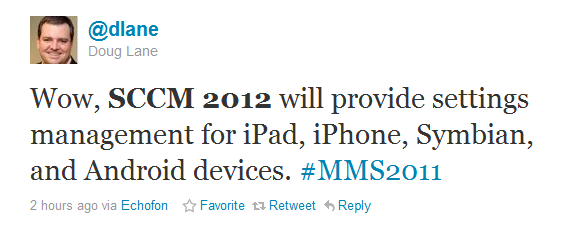Microsoft readies tool for managing iPads, iPhones and Android devices

On day two of the Microsoft Management Summit (MMS), the Softies announced availability of a new beta of one of many products in its System Center family: System Center Configuration Manager (SCCM) 2012.
Ho hum? Not according to some of the folks attending and tweeting from the conference. SCCM 2012, when it ships later this year, is going to enable management for iPads, iPhones, Symbian devices, Android devices and Windows Phone 7 devices. That's quite an expansion, given that SCCM 2007 only managed Windows Mobile devices.
Microsoft made available for download as of today, March 23, the second beta of SCCM 2012. (System Center Configuration Manager "assesses, deploys, and updates your servers, clients, and devices—across physical, virtual, distributed, and mobile environments," as Microsoft explains it.) Microsoft also announced this week at MMS 2011 a beta of its System Center Virtual Machine Manager (SCVMM) 2012 product.
Microsoft is positioning SCCM 2012 as a product that epitomizes the "consumerization of IT" trend in which Microsoft execs are big believers. From the Microsoft Download site:
"Consumerization is a growing challenge for IT organizations. System Center Configuration Manager 2012 helps IT empower people to use the devices and applications they need to be productive, while maintaining corporate compliance and control. The boundaries between work and life have blurred to where people expect reliable, consistent access to corporate services from wherever they are, on any device they're using. Using System Center Configuration Manager 2012, organizations can: Empower people to be productive from anywhere on whatever device they choose. This includes the wide range of devices that connect to Exchange ActiveSync, including Windows Phone, Symbian, iOS, and Android-based devices. Through the new application model, the best application experience can be delivered to the user based on their identity, their device, and their connection."
My first thought when I heard that SCCM 2012 will enable management of iPads is that Microsoft may be undercutting its own argument that Windows-based slates and tablets are inherently better because IT managers can't manage iPads as easily and well as they can Windows-based PCs and devices. If Microsoft makes enterprise management of iPads a key selling point, won't the company be removing one of the advantages it claims for Windows slates?
Because different Microsoft teams have different masters -- and different views of what's needed to drive their respective businesses -- one Microsoft product team may end up doing something that another team may not love. Example: The Bing team is continuing to roll out all kinds of mobile browser enhancements for iPhones and Android phones that Windows Phone 7 users won't get until the end of this year. Another: The Office team has ported OneNote to the iPhone and may end up moving other Office apps to the iOS platform -- a decision that may not be popular with the Windows team, which would prefer Office to remain a crown jewel for Windows users.
Update: My ZDNet UK colleague @sbisson noted that Microsoft is doing away with System Center Mobile Device Manager (SCMDM) and is positioning SCCM 2012 as its successor. However, SCCM 2012 doesn't seem to offer the same set of features and granularity on the device management front as SCMDD does. I've asked Microsoft for confirmation and its migration/support plan for SCMDM customers. No word so far.
